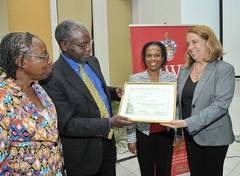Roger Mais Inscription

KINGSTON, JAMAICA — The Roger Mais Collection held at the Main Library at The University of the West Indies, Mona has been officially inscribed in the UNESCO Memory of the World Latin America and Caribbean Regional Register.

The official Certificate acknowledging the inscription of the work of the late Jamaican journalist, novelist, poet, and playwright in the Register, was handed over to Deputy Principal of The UWI, Mona Campus, Professor Ishenkumba Kahwa, by Adviser for Communication and Information, UNESCO Cluster Office for the Caribbean, Mrs. Isabel Viera-Bermudez, at a ceremony held in the Multi-functional Room, Main Library.
Roger Mais (1905-1955) has been recognized as one of the first postcolonial literary figures to emerge in the former British Empire. His legacy lies in the large quantity of unpublished material left after his untimely death.
He is the quintessential anti-colonial activist whose contribution included literary, political, artistic and journalistic output. His collection covers over 20 years of activism and chronicles the birth and development of the anti-colonial, nationalist struggles of the colonized against the colonizer which led to political independence, the creation of a literary tradition and the birth of an artistic movement.
The Memory of the World Register was established in 1995. Its objectives are to facilitate the preservation of the world’s documentary heritage; assist universal access to documentary heritage and increase awareness of the existence and significance of documentary heritage. This is achieved by the maintenance of national regional and international registers.
The Roger Mais Collection is one of two Jamaican fonds (collections) which were accepted at the Fifteenth Meeting of the Regional Committee for Latin America and the Caribbean(MOWLAC) in Mexico.
The Roger Mais Collection comprises both published and unpublished material. It is noted for its juxtaposition of literary and political writings reflecting Mais’s twin interests. It includes virtually every literary genre – poetry, short stories, drama, novels, as well as journalistic pieces and pieces on his theory of fiction; in all, over 300 pieces. The Collection is made up of: 87 short stories, 19 plays, 17 radio plays, 7 novels (3 unpublished), 1 unfinished novel, and 1 folder with over 50 poems. Many of the typescripts have been annotated and corrected. In addition, 21 handwritten notebooks constituting an important part of the Collection include drafts and fragments illustrating the development of his craft; and letters to newspaper editors addressing contemporary social and political events. The Collection also includes newspaper clippings, mainly of Mais’ articles but including other pieces of interest to him: holographs in both pen and pencil; correspondence with overseas publishers, mainly from the United States; correspondence with his literary agents, and personal letters including letters to writers like John Hearne.
In addition, 21 handwritten notebooks constituting an important part of the Collection include drafts and fragments illustrating the development of his craft; and letters to newspaper editors addressing contemporary social and political events.
The Collection also includes newspaper clippings, mainly of Mais’ articles but including other pieces of interest to him: holographs in both pen and pencil; correspondence with overseas publishers, mainly from the United States; correspondence with his literary agents, and personal letters including letters to writers like John Hearne.
In a presentation at the ceremony, head of the West Indies Special Collections, Mrs. Frances Salmon, noted that in order to be accepted for inclusion in the Register, the Mais collection had to satisfy criteria including whether the heritage was unique and irreplaceable; whether its disappearance would constitute a harmful impoverishment of the heritage of humanity; whether it had created great impact over time and/or within a particular cultural area of the region, and if had had great influence (positive or negative) on the course of history.
In addition, the Library chose to prove its significance in the areas of Authenticity, Time, Subject and Theme.
